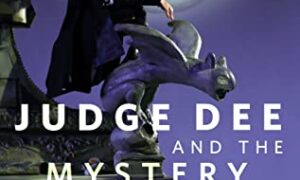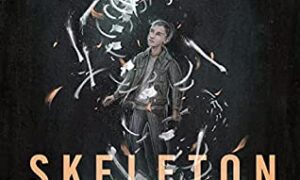 Expatriates by James Wesley Rawles
Expatriates by James Wesley Rawles
My rating: 2/5 cats


yes, i am giving this book two stars cats, but not for the reasons you might think.
the author is a survivalist expert who runs this blog: http://survivalblog.com/. he is also a conservative/constitutionalist libertarian calvinist christian former u.s. army intelligence officer who lives “in an undisclosed location.”
he is also a “technical writer.”
and it’s not the politics or the religious beliefs that manifest themselves in this book that made me give it two stars cats, even though i can see someone getting turned off on that account. it is, rather, that last fact.
because this totally reads like technical writing.
there is a fairly lengthy disclaimer at the beginning, reinforcing the idea that this is fiction, takes place in the future, and is not a commentary on any political situation or perceived military plots by foreign nations. and it reads the way it should, like someone’s gruff, sorta mean ex-military dad:
The making and/or possession of some of the devices and mixtures described in this novel are possibly illegal in some jurisdictions. Even the mere possession of the uncombined components might be construed as criminal intent. Consult your state and local laws! If you make any of these devices and/or formulations, you accept sole responsibility for their possession and use. You are also responsible for your own stupidity and/or carelessness. This information is intended for educational purposes only, to add realism to a work of fiction. The purpose of this novel is to entertain and to educate.
and there it is.
this book definitely does educate, but it does not entertain.
and that’s my gripe. it’s not the bible-quote cold open, or the first-chapter “this is why concealed carry pistol permits are so wonderful” scenario, or the proselytizing “i won’t date you until you take jesus into your heart*,” or the libertarian politics and military minutiae and the overall combination of guns and religion that makes it all “oorah for jesus.”

it’s that there isn’t any story
quick backtrack into “so why did i want to read this?” well, i actually own all three of his previous books. i love survival stories. i tell myself i read all these books because i am amassing information that will help me if the world ever goes nuts and i am forced to fend for myself. and i figured, who better to teach me about survival than a survival expert?? an authority on the matter? and of course, i haven’t gotten around to reading his earlier books, but i saw this one on netgalley and i thought this would give me the kick in the pants i needed to get me to read him, and netgalley promised me that this worked fine as a standalone. but i’m not entirely convinced that this is true. but we will get back to that later. for now, all you need to know is that i am a fan of survival narratives, and that i love to see australia live up to its badass reputation, and this seemed to scratch both itches.
so maybe this is because i haven’t read the first three, and the “this operates as a standalone” was misleading. maybe this is supposed to be just filling in the blanks and if you haven’t read the first three, you are adrift as far as who these people are and why we should care. but if that’s not the case, then this just fails as a novel.
the characters are completely wooden exposition factories, reading like mouthpieces for ideology or “here are some facts i know.”
“That’s a fair grouping for that rifle when using surplus ammo. I think it suits you. Would you like to buy it?” Thomas asked.
Chuck smiled and said, “Yes, I like the idea of owning an American-designed rifle.”
“What? Lee-Enfields are British.”
Chuck shook his head and said politely, “Actually, the SMLE was a design refined in England by the Enfield arsenal, but the original designer was James Paris Lee, who was born in Scotland and raised in Canada, but he moved to the States in the 1850’s. He was a naturalized American citizen, and that’s where he became a gun designer.”
“Oh.”
it’s that “oh” that kills me. that was not a conversation. it was an info-dump.
so, it’s educational, yes, but there’s not much entertainment value. and if you think i am being unfair by isolating this passage, this is the part immediately preceding it:
Chuck liked the rifle. It had a butter-smooth action and it had been partially sporterized with a good-quality forward “scout” style scope mount and a Schmidt & Bender long eye relief scope that was worth almost as much as the rifle itself. The rifle’s 10-round magazine, which could be rapidly reloaded with 5-round stripper clips (or “chargers” in the British Commonwealth shooting lexicon) was a nice plus. He would have preferred a more modern SMLE chambered in 7.62 NATO, but those were quite scarce.
Chuck noticed that the ammo they were using was the later vintage noncorrosively primed ammunition made in Greece in the 1970s, with an HXP head stamp. He would have given anything for some more-recently manufacture3d American-made Federal brand .303 British soft-tip hunting ammunition. Having once used that ammunition, he had been able to put two-round groups from a cold barrel into the same hole on paper at one hundred yards, from a well-cleaned, cut and recrowned barrel. He had even read that in the early 1980s, the American Olin-Winchester plant had produced a modern military ball (FMJ) .303 British under contract for the U.S. government, to be sent to the Afghans fighting the Soviets at the time.
The rifle was a No. 4 Mk 1 model and was stamped ROF(F) – which indicated that it had been manufactured by the Royal Ordinance Factory at Fazakerly, England. As was typical of spotters, the forward portion of the hand guard wood had been removed, and the remaining hand guard tapered and rounded at the tip. Seeing this made Chuck cringe, as he hated to see original military rifles altered. However, he was glad to see that the sporterizing had at least been done neatly and that the scope mount and scope had been expertly installed.
wow. that’s….a lot of very specific information, and isn’t really geared towards the not very gun-savvy reader.
which might be the problem. i don’t read military fiction, just survival fiction. and i guess i misinterpreted what this book was going to be. so maybe in military fiction, this is just the way it is – very little character development, and a lot of gun-porn. and gun jokes:
Then a man just fifteen feet down from Jake and Thomas shouted, “I need some .25-06.” After a pause, he said with greater urgency, “Does anyone have any .25-06, please? I’ve got zero rounds!” Someone heckled. “You gotta be kidding. This ain’t the wide-open prairie. You should have bought a .308”
which i guess is funny, to gun enthusiasts.
there is also a straight-up 4-page LIST of survival manuals and websites that can be downloaded for free and are full of information on survival and currency-safeguarding and military strategy masquerading as conversation in an email. seriously, 4 pages. this is why we have appendices, not how novels operate. slip 5, 10 in there, that’s fine, but there’s a point after which your narrative flow is going to suffer.
and while there is plenty of DIY survivalist information in here, it’s the kind of stuff that is wayyy above my pay grade. like how to construct a bullet-resistant (not bullet-proof we are instructed tartly) gun station out of bank teller windows.
and how to field-strip a seemingly endless array of weapons.
or build a gun-cozy to hide your illegal weapons.
or how to ensure that the advancing army will not see the dashboard-lights of your armored vehicle.
or protect your bullets from rusting in the australian climate.
really, i just need to know what kind of berries are safe to eat.
i mean, he’s clearly a smart guy who has tons of information at the ready about his subject matter. but despite the endless inventories of guns and other weapons, most of the battle sequences are brief and not detailed at all. some of them occur offscreen, some are relayed later as reportage in unconvincing conversations, and only a couple are played out on the page, with so many details about the weaponry, but so little about the characters. oh, and one million acronyms. military types LOVE acronyms, and while they are all defined within the story (and then additionally included in the 18-page glossary at the back), it is just off-putting to a reader to be confronted with so many acronyms.
and just in case you think i am being dramatic:
Right before the Crunch, Indonesia had also bought up as many surplus landing craft as they could find. They bought three Landing Craft, Vehicle Personnel (LCVP’s) from Australia, two Landing Craft Utility (LCUs) from the United States, four Czilm class hovercraft from Russia, and seven 1990s-vintage 25-ton Landing Craft Mechanized (LCM) from the U.S., and even three aging WWII-vintage LCMs from Cambodia. Their finest landing craft purchases, however, were two Landing Craft Air Cushions (LCAC) through the U.S. Foreign Military Sales (FMS) office and an other nearly identical one that came from the Japanese Defense Force.
In his visit to Indonesia in 2010, President Obama announced the gift of twenty-four former USAF F-16s – multirole fighter aircraft – as a sign of friendship to the Muslim world. The gift was building on his first inaugural address, in which he said of other hostile nations, “We will extend a hand if you will just unclench your fist.” Two years later, the Australian government sold four C-130H transport planes to the Indonesian Air Force. And in 2013, Indonesia received six Sukhoi Su-30 Mk 2 multirole fighter planes purchased from Russia in a $470 million deal. This increased their fleet of Su-30s to twenty-nine planes.
riveting.
and it’s all like this. none of the characters get explored as much as the ammo does. for example, there is a character called joseph, who comes to australia on a boat from the philippines, along with his grandfather, shepherding a married pair of missionaries and their seven-year-old daughter to safety. (a crossing that is very violent and involves a lot of shooting and killing and gun-amassing by these missionaries, while i guess their daughter is quietly playing below ship?? they seem entirely unconcerned about her**) but joseph – we don’t hear much about him, but all of a sudden, once in australia, “joseph’s girlfriend” is referenced. twice. we never meet her or learn her name, and we are never given a scene in which he meets this girlfriend. is this covered in the other books?? standalone, my foot!!
this book is completely uneven, using florida as a starting-point and then completely dropping those characters until the very end of the book. which, again, maybe they have more to do in previous books, but still – it is a glaring imbalance that we never return to them until the last chapter.
and we were so close to getting out of this book without a weird sexist situation. so close. but uh-oh!
The first thing Rhiannon said when she saw her sister was “Uggggh. You got old.”
“You’ve got wrinkles, too, sis,” Janelle replied.
“Well, we can count our blessings. At least you never got fat, and I got skinny and stayed that way. And we all have our health.”
Janelle nodded. Yes, God is good.”
yup. lots of people died and we lived through wars and shortages and rebellions and lots of boring talk about rifles, but at least we stayed slim for our menfolk, praise jesus! let’s go buy some shoes!
unbelievable.
so, yeah, not the right book for me. maybe someone with affinities for military fiction can get past all the acronyms and sacrifice of story for walls of information, maybe someone who has read the first three books would be on more solid footing, but for me, this was just not successful as a novel, much less as an entertainment.
but i’m still gonna read those first books. just… not right now.
* which scene is another gripe because of how unrealistic it is:
“Before we delve off into potential, or shall we say hypothetical, matrimonial topics, Mr. Chuck Nolan, I have a big fat question for you.
“Shoot.”
“Are you a Christian?”
“Well, yeah I went to church when I was a kid. I went to Sunday school and all the usual – ”
Ava cocked her head and interrupted, “Yes, but do you know Jesus the Christ as your personal savior?”
“I’ve never thought in those terms,” Chuck admitted. “I mean, I’ve never studied the Bible as an adult, you see. I really wouldn’t know where to start.”
Ava pushed the remains of her plate aside and said, “Do you have a Bible, a King James?”
Chuck nodded.
“Since you understand shooting, then you will understand ‘missing the mark.’ This is man’s biggest problem. I suggest you start by reading the Gospel of John – he depicts Jesus’ work to solve man’s biggest problem very plainly. See if that speaks to you. And if it does, then ask Jesus into your heart.”
Ava stood up from the table and gave a little wave. “Wait! I need your phone number,” Chuck protested.
Ava pulled out a pen and wrote on the back of their lunch receipt. “Here’s my mobile number. I would like you to ring me up, Chuck. But before you do, I’d really like you to be able to tell me, with sincerity, where you stand with God.”
leaving aside, for a moment, why someone who never studied the Bible as an adult, and who we are told didn’t need much space because he had brought just a few possessions with him from the United States upon moving to australia would have included a bible as one of those few possessions, apart from that – seriously, who talks like this?? and especially after the first meeting and the first meal together? wood, wood, wooden.
**later, this poor seven-year-old daughter curls up to sleep with a stuffed wallaby. like, a taxidermied stuffed wallaby, which seems both uncomfortable and gross. but it is a kindness bestowed upon her by a couple the missionaries are staying with, and they are these kinds of people:
“I get a laugh when I hear tourists say they ‘went on safari’ but all they took were pictures. A camera safari is not a real safari.”
and
Both Alvis and Vivian had their speech peppered with foreign words and turns of phrase that they’d picked up on their many overseas hunting trips. For example, they used the Afrikaans word braai instead of “barbecue,” the Shona word chirairo for “dinner,” and the Swahili words karibu for “welcome” and samahani to say “excuse me.”
in other words, insufferable people.







